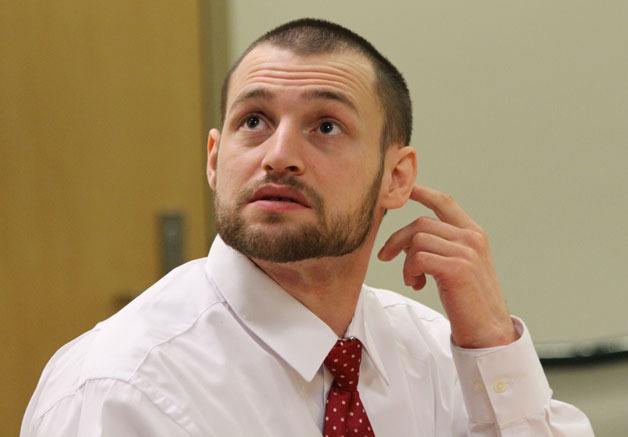The strange trial of an accused killer took even more unusual turns Monday in Island County Superior Court.
The defendant, Joshua Lambert, was temporarily replaced by a television set in the courtroom because of his continued outbursts. The jurors were able to see his disembodied head on the screen, but they could no longer hear his voice.
Later, Lambert returned to the courtroom and testified, but remained at the defense table; the judge ruled he’s too unpredictable to sit next to the jury at the witness stand.
During cross examination, Lambert became combative and refused to answer some of the questions asked him by Prosecutor Attorney Greg Banks.
“You misconstrue everything you quote,” Lambert said, later adding that Banks was “misappropriating facts” and asking trick questions.
Lambert, formerly homeless in Oak Harbor, was acting as his own attorney in the months following the Oct. 3, 2011 murders of his two grandfathers. He is asserting an insanity defense.
Lambert is accused of stabbing to death his paternal grandfather, George Lambert, tying up his great aunt and then stabbing to death his maternal grandfather, August Eugene “Sonny” Eisner.
His grandfathers were both 80 years old and lived in separate residences on North Whidbey.
Judge Vickie Churchill has warned Lambert about his angry outbursts and inappropriate behavior many dozens of times in hearings and at trial. He swore and called people inappropriate names during hearings, but she said acting out in front of a jury is a much more serious matter.
Churchill removed Lambert as his own attorney last Friday after he accused a witness of lying.
Standby attorney, Tom Pacher of Coupeville, took over the defense Monday morning.
Lambert apparently had trouble letting go. He repeatedly interrupted testimony and raised objections, which he’s no longer allowed to do. Churchill warned him to remain silent, but he wouldn’t.
Churchill asked the jury to leave, then had Lambert moved to the jail. A large TV was wheeled in and placed next to the defense table where Lambert had been sitting. He watched the trial over video from a room at the jail for about 40 minutes.
Churchill asked him during the noon break if he would behave if brought back into the courtroom. He said he would and attended the afternoon session in person.
Robert Deutsch, a Seattle psychologist, spent much of the day on the stand. He is the defense’s expert witness and testified that Lambert suffers from paranoid schizophrenia. He testified that Lambert could not tell right from wrong on the day of the murders because of the strength of his hallucinations and delusions.
He testified that Lambert believed that laws were “suspended or superseded” by the voice of an authority figure in Lambert’s mind.
Lambert thought he was not just allowed to kill, but commanded to do whatever he could to save his son, Deutsch said. The voices allegedly told Lambert that his son was kidnapped by an “agent” and he had to save him.
Lambert went to the homes of his grandfathers to look for a gun he thought he needed to kill the agent, Deutsch testified.
“It is my opinion that he believes he was doing the morally right thing.”
On cross examination, Banks questioned Deutsch about his credentials and the evidence he used to diagnose Lambert. Banks emphasized that he hadn’t interviewed any of the people who spent any time with Lambert on the day of the murders, but received voluminous information from Lambert himself.
Banks also asked Deutsch if it was true he refused to testify until after he was paid by the court.
Pacher objected to the question, however, and Churchill ruled Deutsch didn’t have to answer it.
In the afternoon, Lambert testified from the defense table while his attorney, Pacher, stood next to the witness stand to question him.
The questions focused on symptoms of mental illness.
Lambert said he first started hearing voices when he was 19 years old.
He said he told friends about the voices, but not his parents or other authority figures.
He said he thought that everyone communicated “telepathically.”
“I thought I was mentally challenged because I didn’t hear voices until I was 19,” he said.
Lambert said he tended to stay away from other people because he thought others could hear his thoughts and that he could hear them saying negative things about him telepathically.
Banks started cross examining Lambert late in the day. Lambert quickly became defensive as the prosecutor asked him about whether he’d admitted to his mother that he lied in a civil court case years ago. Lambert said he had only exaggerated.
Banks also asked about Lambert’s research into the symptoms of schizophrenia. When he was acting as his own attorney, Lambert had access to research materials.
Lambert wouldn’t answer “yes or no” to the question of whether he read the Diagnostic and Statistical Manual of Mental Disorders, but repeatedly said he only read it after he reported his initial symptoms.
Lambert refused to answer questions about his cohort in an assault in Alaska, becoming angry and repeatedly saying he wouldn’t talk about someone else.
Banks eventually gave up on some questions, saying that he took Lambert’s silence to be an admission.



